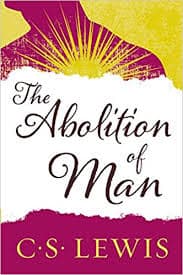The Abolition of Man
Okay, I should probably acknowledge something right at the front end of this short review. And that is that I have read The Abolition of Man by C.S. Lewis at least nine times, and I have quoted from it times without number. It is one of my “go to” books, and there are layers in it that I still haven’t comprehended. I say this as someone who is commending the book to you, but it should be clear to you that my commendation is not really objective anymore.

What I have learned from this small book (what I have yet to learn is obviously not something I can discuss with any competence) has been of incalculable worth to me.
The book is about the importance of textbooks in the education of our children, and Lewis shows how the corrosive effects of relativism will rot out any container you try to put them in. If that container happens to be the minds of our children, then the relativism will rot out the minds (and souls and hearts) of our children. And so I commend this book to everyone involved in the crucial task of recovering a Christian approach to education. It is a book for all parents and educators.
But Lewis is after something much larger than wanting schools to graduate this kind of person over against that kind of person. He is fighting for the survival of mankind as such. He is showing how the adoption of relativism is ultimately going to result in an inability to graduate persons at all. This is what he means by the abolition of man in the title. The kind of education he fears is the kind of education that produced Mark Studdock in That Hideous Strength, his fantastic novel that treats many of the same themes.
This book explains the entire circus parade that is our contemporary culture, and does so from the drum major at the front down to the chimpanzees and clowns bringing up the rear. There is a deep reason why identity is such an issue right now. There is reason why—even among Christians—there is such confusion among us about who we are. Lewis shows, in effect, that you cannot know who you are if you don’t even know what you are.
The flippant debunking of traditional values that Lewis protests at the beginning of the book has a really sinister conclusion. If you “see through” this value and that value, you think you are growing in wisdom, when it is really only a corrosive cynicism. But each new layer that you find can itself be “seen through.” And when the entire process is complete, and the cosmos becomes transparent to you, as Lewis shows, this is the same as not being able to see anything at all.
So if you want to know why your children in the government schools (and, by the way, you should get them out) are being taught things that you differ with, this book will help you understand that. But if you also want to know why the government schools are teaching that there is no such thing as a fixed nature for man, and that anybody can become anything or anyone they want, this book explains that as well. Billy can become Suzy because there is no such thing as the nature of man, and so every individual is really only a lump of a malleable and plastic substance, ready to be shaped by the rulers, who themselves are no longer men. The conquest of nature by man has ended with the conquest of man by nature.
And keep this in mind. What most contemporary Christian “thought leaders”— but we should really call them thought followers—cannot see or understand, even while it is unfolding right in front of them, Lewis saw and predicted over half a century ago. We are having trouble with lay-ups in the opening drills, and there was Lewis, quite a long time ago, with a buzzer-beating half-court shot. And he was an Irishman who had never even played basketball.
Okay, the metaphors have seized control, and are starting to run off with me. Never mind that. If you have not read this book, get it and read it. If you have read it, I would urge you to get it down and read it again.

